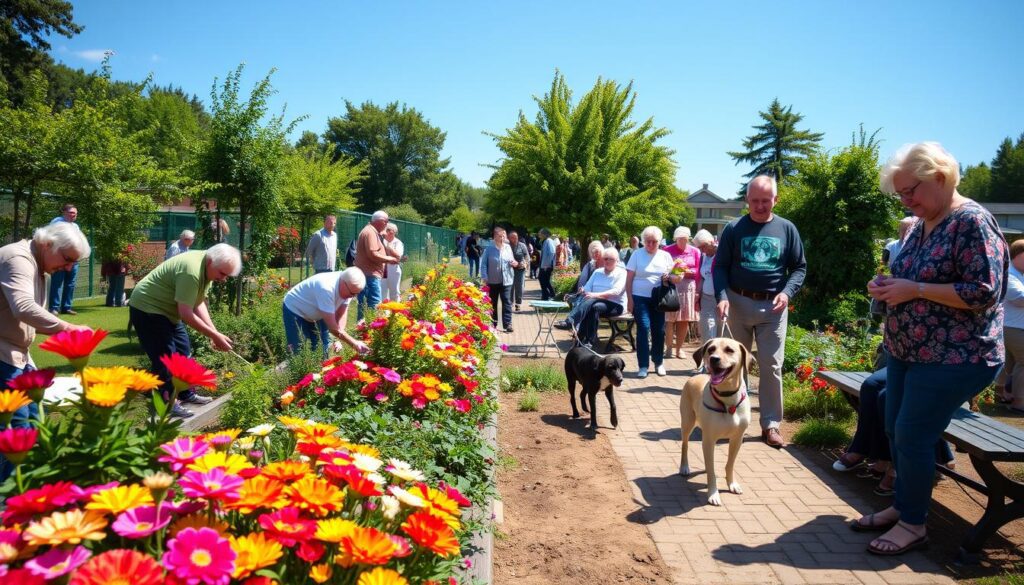How To Maintain A Positive Mental Attitude In Early Retirement ?
How To Maintain A Positive Mental Attitude In Early Retirement ? : Starting early retirement planning means focusing on your mental health. This life change can be big, and keeping your mind healthy is key. You’ll need strategies to stay upbeat and active.

We’ll share tips on keeping a positive mindset in early retirement. This includes making a daily routine and finding new hobbies. We’ll also talk about how to keep your mental health in check.
Key Takeaways
- Early retirement planning is key to a happy and fulfilling life
- Prioritizing mental health in retirement is essential
- Developing strategies to stay positive and engaged is critical
- Creating a meaningful daily routine can help
- Building new purpose through activities and hobbies is vital
- Considering mental health in retirement is important for overall well-being
Understanding the Mental Challenges of Early Retirement
Starting your retirement journey can bring mental hurdles. Positive thinking helps you face these challenges head-on. You might feel lost, bored, or disconnected, which can be tough to handle.
It’s important to know the mental shifts you’ll go through. This includes adjusting to a new routine, finding new interests, and dealing with the loss of your professional identity. Being aware of these changes helps you prepare and stay positive.
Common Psychological Adjustments
- Adjusting to a new daily routine
- Finding new purposes and activities
- Coping with the loss of a professional identity
Understanding these adjustments and using positive thinking daily can make your retirement smoother. A positive mindset is essential for enjoying your early retirement.
Creating a Meaningful Daily Routine
Early retirement is a big change. It’s key to find a daily routine that makes you happy. Try adding retirement activities to your day. This could be painting, gardening, or cooking. These hobbies give you a sense of purpose.
Having a good daily routine keeps you focused and excited. Start by listing your favorite activities. Then, add them to your daily or weekly plan. For instance:
- Monday: Volunteer at a local charity
- Tuesday: Take a cooking class
- Wednesday: Go for a hike or walk
- Thursday: Practice yoga or meditation
- Friday: Meet with friends or family
Adding these activities to your daily routine gives you structure and purpose. Don’t forget to include self-care and fun activities. A fulfilling daily routine helps you enjoy your early retirement.
Building New Purpose Through Activities and Hobbies
Early retirement is a great time to grow personally and try new things. Personal growth and hobbies for retirees keep your mind sharp and your spirit high. You might enjoy painting, gardening, or playing music.
Popular hobbies for retirees include:
- Volunteering for a cause you’re passionate about
- Joining a book club or study group
- Taking up a new sport or physical activity
- Learning a new language or skill
Setting personal growth goals keeps you motivated. Try to learn something new or take on a challenge. This will make you feel accomplished and happy.
Find activities that make you happy and fulfilled. Whether it’s through hobbies for retirees or other interests, focus on your personal growth and well-being.
By focusing on personal growth and new interests, you can live a fulfilling life in early retirement. So, why not start today and see the benefits of hobbies for retirees?
| Hobby | Benefits |
|---|---|
| Painting | Relaxation, creativity, self-expression |
| Gardening | Physical activity, stress relief, connection with nature |
| Playing a musical instrument | Cognitive stimulation, emotional expression, social connection |
Maintaining Social Connections in Retirement
As you start your early retirement, keeping up with social connections is vital. It helps you stay happy and healthy. Friends, family, and community are important to fight loneliness and isolation, common in retirement.
Building a strong support network is key. It keeps you positive and engaged in this new chapter of life.
To grow your social circle, think about joining groups or clubs that match your interests. This could be a book club, sports team, or volunteer group. You can also take classes to learn new things and meet others. Cooking, art, or language classes are great options.

- Join a social group or club that aligns with your interests
- Take classes or workshops to learn new skills and meet new people
- Volunteer for a cause you’re passionate about
- Attend community events and gatherings
By focusing on social connections and retirement relationships, you can make your retirement fulfilling. Remember, staying connected with others is essential for a positive mind and well-being.
How to Maintain a Positive Mental Attitude in Early Retirement
To keep a positive mindset in early retirement, focus on mental well-being. Daily gratitude practices are key. Try keeping a gratitude journal or telling a friend three things you’re thankful for.
Building resilience is also important. Practice mindfulness, set realistic goals, and stay in the present. These steps help you face early retirement’s challenges with positivity.
Practicing Daily Gratitude
- Keep a gratitude journal to record things you’re thankful for
- Share your gratitude with a friend or family member
- Practice mindfulness to stay present and focused
Managing Retirement Expectations
Having realistic expectations about early retirement is vital. It’s a big change, and it’s okay to feel a range of emotions. By managing your expectations and focusing on the good, you can stay positive and enjoy this new chapter.
| Gratitude Practice | Benefits |
|---|---|
| Keeping a gratitude journal | Reduces stress and anxiety |
| Practicing mindfulness | Improves mental clarity and focus |
| Sharing gratitude with others | Strengthens relationships and social connections |
Physical Health as a Mental Wellness Tool
In early retirement, it’s key to see how physical health and mental wellness are connected. Taking care of your body can really boost your mind. This means regular exercise, eating well, and getting enough sleep.
Physical activity greatly affects your mental state. It can lower stress and anxiety, and even make you feel happier and sharper. Eating right is also important for your mind. Foods like salmon and walnuts help your brain and can fight off depression.
Exercise and Brain Health Connection
Studies show that exercise is good for your brain. It helps grow new brain cells and keeps your mind sharp. Plus, it can prevent serious diseases like heart disease and diabetes, which hurt your mental health.
Nutrition for Mental Clarity
Eating well is vital for your brain to work its best. Foods like berries and leafy greens are full of antioxidants. They help your brain stay clear and focused. Drinking lots of water is also key for staying sharp.
Sleep Hygiene Importance
Getting enough sleep is critical for both your body and mind. Sleep helps your body fix itself and keeps your immune system strong. Not sleeping well can make you tired, slow your thinking, and increase stress, all bad for your mental health.

By adding exercise, healthy food, and good sleep to your life, you can greatly improve your health and mood. Remember, taking care of your body is key to staying mentally strong in early retirement.
Financial Peace of Mind Strategies
As you start your early retirement, financial planning is key to your mental health. A solid retirement income plan can lower stress and let you enjoy life more. Think about getting a financial advisor to guide you with your retirement finances.
To find financial peace, focus on financial planning and make a budget that suits you. Here are some tips:
- Track your expenses to see where your money goes
- Make a retirement income plan with different income sources
- Look into ways to improve your retirement finances, like investing in a variety of assets
By managing your financial planning and making smart choices about your retirement finances, you can have a secure and peaceful retirement. Always check and update your plan to fit your changing needs.
With a strong financial planning base, you can focus on happiness and fulfillment in your early retirement. By focusing on your retirement finances and planning for a steady income, you can have a more peaceful and secure retirement.
| Financial Planning Strategy | Benefits |
|---|---|
| Creating a budget | Reduces stress and anxiety, helps you make informed decisions about your money |
| Investing in a diversified portfolio | Optimizes your retirement finances, provides a chance for long-term growth |
| Working with a financial advisor | Offers expert advice, helps you make informed decisions about your retirement finances |
Embracing Personal Growth Opportunities
As you start your early retirement, focusing on personal growth is key. It keeps your mind positive. Try new things that challenge and inspire you. This keeps you motivated and happy.
One great way to grow is through continuous learning. You can take classes or go to workshops.
Here are some steps to start your personal growth journey:
- Try new hobbies or interests
- Volunteer for things you care about
- Help others by mentoring
- Start your own business or venture
By taking these steps, you keep learning and growing. Continuous learning keeps you excited and motivated. This makes your early retirement more fulfilling and meaningful.
Personal growth is a lifelong path. Early retirement is a great time to focus on yourself. By learning and trying new things, you can live a life full of joy and satisfaction.
| Activity | Benefits |
|---|---|
| Volunteering | Meets new people, gives back to the community, sense of purpose |
| Mentoring | Shares knowledge and experience, helps others grow, sense of fulfillment |
| Starting new ventures | Encourages innovation, creates new opportunities, sense of accomplishment |
Conclusion: Thriving in Your Early Retirement Journey
Starting your early retirement journey is exciting. But, it needs effort, planning, and a positive attitude. By using the tips from this article, you can live a healthy and fulfilling life in retirement.
Take care of your mental health by being grateful every day. Also, learn to bounce back from tough times and manage your retirement dreams. Keep in touch with loved ones and stay active in your community.
Try new things like hobbies, volunteering, or starting a business. This keeps you growing and feeling fulfilled in your early retirement.
With the right mindset, you can enjoy your early retirement years fully. Seize the day, appreciate every moment, and start this journey with joy and confidence.
FAQ
How can I maintain a positive mental attitude in early retirement?
To keep a positive mindset in early retirement, you need to make an effort. Start by creating a daily routine that means something to you. Find new hobbies and activities that give you purpose.
Stay connected with friends and family. Practice gratitude and focus on your physical and financial health. These steps will help you enjoy your retirement.
What are some common mental challenges in early retirement?
Early retirement can lead to feelings of loss and boredom. It’s normal to feel disconnected. Recognizing these feelings is the first step to overcoming them.
Identify what might hold you back mentally. Prepare yourself for the transition. This way, you can thrive in your new life stage.
How can I create a meaningful daily routine in early retirement?
A meaningful daily routine is key to a positive retirement. Fill your days with activities that make you happy and fulfilled. This could be trying new hobbies or volunteering.
Having a structured routine keeps you energized and excited. It helps you make the most of your retirement.
What are some ways to build new purpose through activities and hobbies in early retirement?
Activities and hobbies can give you a new sense of purpose. Explore new interests and set personal goals. Find joy in leisure activities.
Try new things and join groups that match your interests. Setting achievable goals keeps you motivated and engaged.
How can I maintain social connections in retirement?
Keeping in touch with others is vital for your mental health in retirement. Stay connected by joining groups or volunteering. This helps you stay positive and supported.
Building relationships in retirement can be rewarding. It keeps you engaged and happy in your new life.
What are some strategies for maintaining a positive mental attitude in early retirement?
Staying positive in retirement takes effort and practice. Start a gratitude journal and practice mindfulness. Set realistic goals to keep your focus.
These strategies help you stay positive and focused on your retirement goals.
How does physical health impact mental wellness in early retirement?
Your physical health affects your mental well-being. Exercise and healthy eating boost your brain health. Good sleep is also essential for your mental clarity.
By taking care of your body, you support your mental health. This is key to enjoying your retirement.
How can I achieve financial peace of mind in early retirement?
Financial security is important for a positive retirement. Manage your finances well and plan your retirement income. Work with a financial advisor if needed.
Creating a budget and finding ways to increase your income can help. This ensures you have financial peace of mind.
What personal growth opportunities are available in early retirement?
Early retirement offers many chances for personal growth. Keep learning and explore new ventures. Take classes or start hobbies to stay challenged and fulfilled.
Embracing growth opportunities keeps you motivated and engaged. It makes your retirement fulfilling and exciting.
